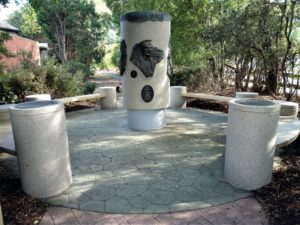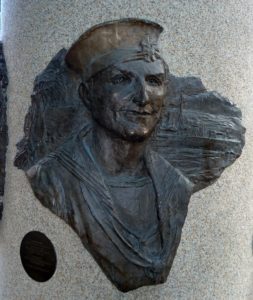By Dr John K Haken
The Victoria Cross for Australia continues the traditions of the Imperial Victoria Cross as our highest award for bravery. Like several other Commonwealth countries, Australia adopted a local honour system but retained the Victoria Cross as the principal bravery award. 96 Victoria Crosses were awarded to Australians under the Imperial system since the Boer War and subsequently 4 Victoria Crosses for Australia. However, none of these awards were made to naval personnel. A procedure sometimes followed in the past was to approve a lesser Award including the recent posthumous naval award to ordinary seaman Teddy Sheean.
Victoria Crosses Awarded
A total of 1358 Victoria Crosses have been awarded to 1355 recipients to date. Of these 96 have been awarded to Australian servicemen. The following table provides the numbers awarded to Commonwealth naval personnel.
| Award System | Navy | Number Awarded
|
Notes |
|
Victoria Cross, Imperial
|
Royal Navy | 117 |
I. |
| Royal Australian Navy | 0 | ||
| Royal Canadian Navy | 3 | ||
| Royal New Zealand Navy | 0 | ||
| Victoria Cross for Australia | Royal Australian Navy | 1 of 5 to RAN personnel | II. |
| Victoria Cross for Canada | Royal Canadian Navy | 0 | III. |
| Victoria Cross for New Zealand | Royal New Zealand Navy | 0 of 1 to RNZN personnel | IV. |
Notes
- 68 to ship-based Royal Navy personnel, 49 to other Royal Navy Services. The majority of awards employed the dark blue for the navy which was replaced on 22 May 1920 by the crimson ribbon previously specified for the army. The first Victoria Cross recipient was a sailor.
- Victoria Cross for Australia was instituted in 1991
- Victoria Cross for Canada was instituted in 1993
- Victoria Cross for New Zealand was instituted in 1999
The recent much belated posthumous award of the Victoria Cross for Australia[i] [ii]and replacement of the Mention in Despatches[iii] follows years of agitation and several enquiries.
As Sheean’s Commanding Officer, Lieutenant Commander D. Richards did not provide a recommendation the Honours and Awards Tribunal denied the award of a Victoria Cross because “his actions did not reach the particularly high standards required for recommendation of a Victoria Cross” However Sheeans heroism and sacrifice, has been remembered and commemorated by many others. Eight of these commemorations are now described.

The Sheean Memorial consisting of a bass relief sculpture of Sheean in uniform is located in the main street of Latrobe, Northern Tasmania. It is at the entrance to the Sheean Walk of Remembrance. The Sheean Walk is 1.2 kilometres in length and features plaques relevant to conflicts of Word War 2 and later in Korea, Malaya, Borneo and Vietnam campaigns in which Australia was involved. During 2001 a plaque was unveiled following the commissioning of HMAS Sheean. Both the memorial and Walk projects were initiatives of the Latrobe Council financed by public subscription. The memorial was officially opened on 12 December 1992.

Another memorial also in Northern Tasmania was erected by the RAN Corvettes Association of Australia and dedicated on 1 October 1987. The memorial is located in Shropshire Naval Memorial Park, Dial Street Ulverstone.
The Teddy Sheean Memorial Grants Program established by the Tasmanian Government through the Department of Communities in 2014 initially for 3 years provides grants for the maintenance of war memorials. The program was continued in 2018-2019 for another 3 years. The budget being $100,000 per year, distributed in 2 rounds of grants, each of $50,000.
The Royal Australian Navy honoured Teddy Sheean, by naming a Collins Class submarine HMAS Sheean. Sheeancommissioned on 23 February 2001. This was the first occasion a vessel of the RAN was named after a rating. The submarine was launched on 1 May 1999 by Mrs Ivy Hayes, a sister of Teddy Sheean. In addition the Sheean Award was established in the Seamanship School at HMAS Cerberus for the best trainee and the Ordinary Seaman Sheean Award for Gunnery was presented between 1986 and mid 1990’s for the Quartermaster/Boatswains Mate course.
The Australian Navy Cadets named a training unit NTS Sheean at Tewantin Queensland in his honour in 2003. The Veterans Affairs Minister announced in parliament that a full-size statue of Teddy Sheean will be erected in Latrobe. A painting of Teddy Sheean by Dale Marsh in 1978 firing his Oerlikon Gun on the deck of HMAS Armidale hangs in the Australian War Memorial. The bar at the Latrobe RSL Club is named The Sheean Bar as a lasting tribute.
Disquiet about the initial decision not to award a Victoria Cross continued over the decades and the matter was the subject of several enquires. The enquiry of 2013 (Valour Enquiry) recommended that The Victoria Cross for Australia not be awarded, a recommendation accepted by the Government. A second enquiry in 2019 by the Defence Honours and Awards Appeals Tribunal recommended that the award be made but the Government was not convinced and the award was not supported. As the matter was becoming a political issue, particularly in Tasmania, the Government appointed a third and independent enquiry. The enquiry was chaired by Dr Brendan Nelson, the former Director of the Australian War Memorial. The recommendation of this enquiry[iv] to make the award was immediately accepted and acted upon by the Government of Australia.
The youngest of a large family of 14 children, Edward Sheean[v] was born in northern Tasmania at Lower Barrington near Devonport on 28 December 1923. Soon after the family moved to Latrobe also adjacent to Devonport. Young Teddy worked as a farm labourer before enlisting in the Royal Australian Navy Reserve on 21 April 1941. After training in Hobart and Victoria he was posted to Sydney on 11 May 1942 and destined to form part of the crew of the newly constructed Bathurst Class minesweeper HMAS Armidale.
War service for HMAS Armidale commenced on 29 November 1942 when the vessel sailed for Timor in company of sister ship HMAS Castlemaine to evacuate troops and civilians. The ships escaped attack by Japanese aircraft after missing a rendezvous with the auxiliary patrol boat HMAS Kuru. Subsequently a decision was made that HMAS Kuru and HMAS Armidale would proceed independently to Timor. Unfortunately, enroute to Timor, HMAS Armidale[vi] was torpedoed and bombed by Japanese aircraft.
After the order to abandon ship, Teddy Sheean although seriously wounded assisted in launching life rafts before manning his gun thus protecting the survivors. One aircraft was hit before Teddy Sheean sank with the ship on 1 December 1942 still firing. Of the 149 on board HMAS Armidale, there were 49 survivors.
[i] 1. Joint Media Release Prime Minister, Minister for Defence 10 August 2012
[ii] 2. R. Harris Sydney Morning Herald 12 August 2012
[iii] 3. London Gazette Supplement No 36072 2947 29 June 1943
[iv] 4. Historic Victoria Cross Report of Expert Panel 10 August 2012
[v] 5. N. Watson Edward Sheean Australian Dictionary of Biography Volume 16 Australian National University Australia 2002
[vi] 6. Kevin Smith, The sinking of HMAS Armidale on 1 December 1942, Occasional Paper No 9, Naval Historical Society of Australia published 1 July 2017
